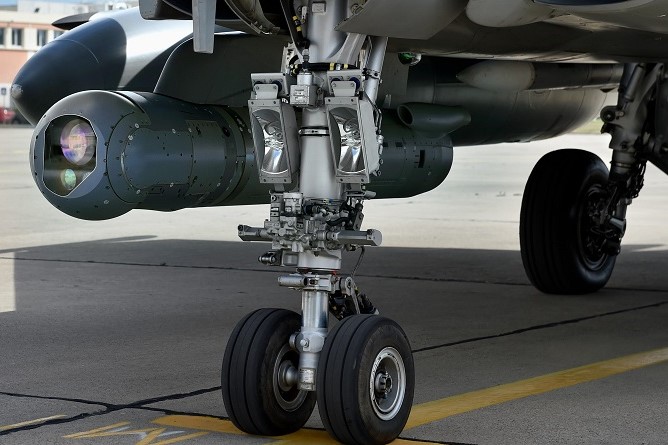French defense technology giant Thales has incorporated artificial intelligence (AI) capabilities into its upgraded Talios laser designation pod, a key component for Dassault Aviation’s Rafale fighter jets.
On November 29, the company announced that the upgraded Talios pod, set to debut with the Rafale F4.3 standard in 2026, integrates AI to offer real-time onboard image analysis.
This feature drastically improves the speed and accuracy of object detection, which makes it a powerful tool for air-to-ground and air-to-air missions.
Thales says the integration of AI will optimize operations by reducing the time pilots spend identifying targets, allowing them to focus on executing mission objectives.
The AI-enabled pod is designed to automatically detect and classify objects of interest—such as vehicles, buildings, or other potential threats—in real-time. Once identified, the pod presents this information to the pilot, who can then decide whether to engage the target.
This automation speeds up the decision-making process, reducing the pilot’s workload and increasing the tempo of operations.

According to the company, this upgrade “will be the first function on board the Rafale to make such intensive use of deep learning technologies.”
The AI system, powered by Thales’ cutting-edge cortAIx accelerator, processes airborne imagery up to 100 times faster than previous models. This gives pilots a faster response time when assessing threats and identifying targets.
Thales has also eliminated the need for external data links and has embedded the AI system directly within the Talios pod. This ensures secure and uninterrupted operation in complex combat environments, where communication with ground stations might be disrupted.
The pod is capable of operating autonomously, even in hostile and remote areas, by processing and delivering critical data directly to the pilot in real-time.
The AI-driven system’s ability to function without the need for external data links also overcomes the challenges of temperature fluctuations, vibrations, and energy consumption that often hinder onboard systems.
Moreover, the AI algorithms used in the Talios pod were trained with a large database of imagery, compiled from test flights and French military operations.
Thales said that it worked closely with French military personnel to tailor the system to the specific needs of Rafale pilots to make sure the AI system aligns with operational requirements.
Talios Laser Designation Pod
The Talios laser designation pod, which first entered service in 2018, has become an indispensable asset for France’s Rafale fighter jets.
Since its introduction, the pod has been integral to a range of air-to-ground operations, including targeting, reconnaissance, and precision strikes, and has proven equally effective in air-to-air missions by helping in the visual identification of enemy aircraft.
Originally derived from the Damocles pod, the Talios is a highly versatile and multi-functional system. It can operate effectively both during the day and at night.
These features make it a valuable tool for pilots to certain they have the most accurate and up-to-date information to execute their missions with precision.
The Talios laser designator targeting pod was used for the first time in an operational strike mission by the French Air and Space Force on January 22-23, 2021. Since then, Thales has continued to upgrade the pod as part of the broader Rafale F4 standardization initiative.
The Vision Permanent function, for instance, provides a virtual real-time 3D map overlay of the operational environment to boost situational awareness.
In addition, the upgraded system includes a new air-to-air identification mode, a new day color sensor with extended range coverage compared to the original pods’ thermal cameras, and added tactical air reconnaissance modes.
The system is connected via a top-down datalink to enhance the transmission of real-time data to ground forces. These advanced features are important for fighter aircraft pilots to improve mission effectiveness and operational coordination.
Meanwhile, Thales first introduced the potential of AI to the French armed forces in 2018. Following extensive discussions and evaluations, a contract was finally awarded in December 2023 to include the technology in its systems, with the upgraded pod expected to be operational by 2026.
The integration of AI into the Talios pod is set to revolutionize the way data is processed and shared during missions.
Thales said that AI’s true impact will be felt in the era of collaborative combat, where data exchange between different assets deployed in the theater of operations will be essential.
The AI system is designed to filter out irrelevant data to certain that only the most crucial information is transmitted, thereby avoiding the overload of communication systems that could hinder mission effectiveness.
- Contact the author at ashishmichel(at)gmail.com
- Follow EurAsian Times on Google News